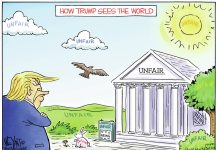
By Harry McCawley
I will miss being edited by Geoff Vincent.
It’s been a while since Geoff last took to a keyboard to point out a variety of my misspellings, improper punctuations or poor sentence construction. Sometimes he suggested that my opinions on certain subjects could use a little common sense.
It wasn’t just his edits that drew my grudging admiration. It was the way he pointed those errors out to me that I so admired. His corrections were pure literature.
I came across one in particular in which Geoff needed only a few words to make his point — a 1980 commentary on an editorial in The Republic urging readers to inform the news staff of any errors in its stories so that they could be promptly corrected.
Goff wrote, “Republic, you are brave. Any newspaper that invites readers to report its errors — in an editorial that alone has three — has got to have its heart in the right place.”
Admittedly there was a sting to Geoff’s critique — especially when we re-read the editorial and confirmed Geoff’s discovery of our three errors. It turned out that two were genuine typos, but whether it was the mistake of mechanical or human doings was beside the point. We should have been able to spot the mistakes at some point in the process.
Sad thing is that those edits were after the fact. I still appreciated them because it was his way of telling us that we could do better.
This is not to say that I only got reprimands from his keyboards. Mixed in with his genuine critiques were compliments about something I had written or the way I had written it. Those were real keepers.
I’m not sure when I got Geoff’s last “edit.” Age began playing its inevitable game of catch-up with him several years back. The game ended Aug. 11 when he died at 97.
Obviously at that age one could be described as having lived a full life. In Geoff’s case that would be an understatement.
I envied part of what Geoff was able to accomplish. I dreaded part of what he had to endure.
I met him in the late 1970s shortly after he had taken a position as manager of employee communications worldwide for the then-named Cummins Engine Co. In that position he also served as editor of the company magazine Power Team.
Even though he was a “suit” in the corporate world, the Englishman had an impish quality that drew people to him. He was the sort of fellow with whom you’d like to sit across a table at the old Surrey Inn and down a beer or two.
I think he was immediately drawn to the news staff at The Republic because some of them could relate to his background. In reality, most of us were jealous of what Geoff did and how he went about doing it.
It was his pre-Columbus background that got to me.
In the years immediately preceding his employment at Cummins, Geoff had been the Sunday Editor for the Louisville Courier-Journal, a newspaper I had grown up with through my childhood in neighboring Bardstown, Kentucky.
Primarily through the efforts of owner-publisher Barry Bingham Sr., the C-J had become a quality newspaper, one admired not just within the city or state but across the country.
Under the senior Bingham it achieved an international status, primarily because of quality of the staff he gathered around him. Geoff certainly fit into that mold.
In fact he had created his own unique mold on the path to Louisville and eventually to Columbus. It was one filled with excitement, achievement and despair. He was born in Great Britain and retained that unique British accent throughout his life even though his family was uprooted and moved to the United States, where he became victim to the first of many personal tragedies that were to follow.
His father died at a young age, and Geoff spent many of his formative years in an orphanage. Reaching adulthood, he fostered an early interest in journalism by taking a writing position with the St. Louis Post-Dispatch.
That career in journalism took a temporary turn with the outbreak of World War II when he was recruited by the Army’s Counter Intelligence Agency and sent into hostile enemy territory to gather information.
With the end of the war came conflicting emotional experiences. He married Mary Loy, a girl he had met in St. Louis and formed a union that produced two children. Career-wise, he achieved the dream of many a newsman, joining the staff of the highly esteemed New York Times.
Out of that happiness came tragedy. Mary died at a young age and Geoff, now a widower, was left to raise two children. Eventually, he found a partner in that mission, a co-worker at the Times and a fellow Brit — Adele Bagnall.
Eventually, the couple moved to Louisville, where he had been recruited to join the staff of the up-and-coming Courier-Journal. While in Louisville, they welcomed into the world their own child, a daughter named Mary Jane.
Eventually Geoff retired from the life of day-to-day journalism and moved to Columbus with his family where he and Adele took positions with the then-named Cummins Engine Co.
At the time it seemed like an odd move for a man who had experienced so much in his journalistic career, but Geoff fit into his new life as if he had lived in Columbus from birth.
He took on missions dealing with topics which might have seemed other-worldly to former New York Times staffers.
I still laugh at how he solved the welcome signs to Columbus at the intersection of what were then known as U.S. 31 or Indiana 11 with no further clue as to where either would take them. Visiting motorists to the downtown area often wound up someplace else on the north side when they followed the U.S. 31 route.
Geoff, who had no engineering background as far as I know, dropped a note to the Department of Transportation, suggesting a simple solution. The U.S. 31 sign would designate its destination as National Road and the Indiana 11 sign would tell motorists they would be entering the downtown.
Within a matter of a few weeks the two new signs suggested by Geoff were in place.
In his 97 years, Geoff accomplished much and lost much. He was orphaned at a young age, preceded in death by a wife, a son and a daughter and lived through the Great Depression and an even greater war.
For me, and this is on a purely personal note, he taught me that I could always do better.
Harry McCawley is the former associate editor of The Republic. He can be reached at [email protected].



